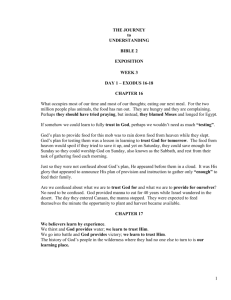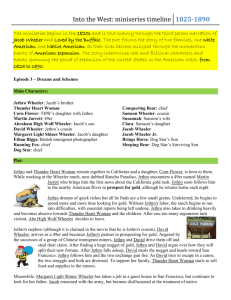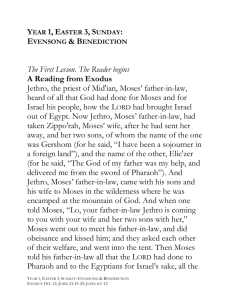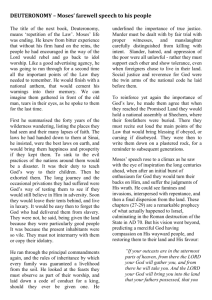We All Need a Jethro - Donway Baptist Church
advertisement
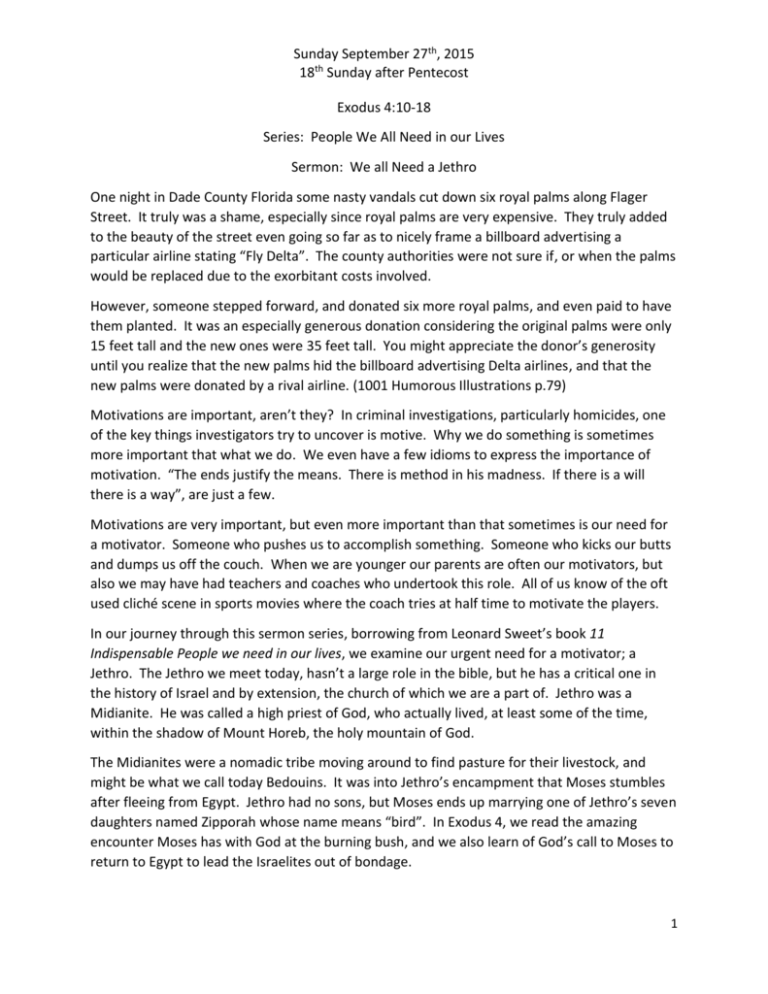
Sunday September 27th, 2015 18th Sunday after Pentecost Exodus 4:10-18 Series: People We All Need in our Lives Sermon: We all Need a Jethro One night in Dade County Florida some nasty vandals cut down six royal palms along Flager Street. It truly was a shame, especially since royal palms are very expensive. They truly added to the beauty of the street even going so far as to nicely frame a billboard advertising a particular airline stating “Fly Delta”. The county authorities were not sure if, or when the palms would be replaced due to the exorbitant costs involved. However, someone stepped forward, and donated six more royal palms, and even paid to have them planted. It was an especially generous donation considering the original palms were only 15 feet tall and the new ones were 35 feet tall. You might appreciate the donor’s generosity until you realize that the new palms hid the billboard advertising Delta airlines, and that the new palms were donated by a rival airline. (1001 Humorous Illustrations p.79) Motivations are important, aren’t they? In criminal investigations, particularly homicides, one of the key things investigators try to uncover is motive. Why we do something is sometimes more important that what we do. We even have a few idioms to express the importance of motivation. “The ends justify the means. There is method in his madness. If there is a will there is a way”, are just a few. Motivations are very important, but even more important than that sometimes is our need for a motivator. Someone who pushes us to accomplish something. Someone who kicks our butts and dumps us off the couch. When we are younger our parents are often our motivators, but also we may have had teachers and coaches who undertook this role. All of us know of the oft used cliché scene in sports movies where the coach tries at half time to motivate the players. In our journey through this sermon series, borrowing from Leonard Sweet’s book 11 Indispensable People we need in our lives, we examine our urgent need for a motivator; a Jethro. The Jethro we meet today, hasn’t a large role in the bible, but he has a critical one in the history of Israel and by extension, the church of which we are a part of. Jethro was a Midianite. He was called a high priest of God, who actually lived, at least some of the time, within the shadow of Mount Horeb, the holy mountain of God. The Midianites were a nomadic tribe moving around to find pasture for their livestock, and might be what we call today Bedouins. It was into Jethro’s encampment that Moses stumbles after fleeing from Egypt. Jethro had no sons, but Moses ends up marrying one of Jethro’s seven daughters named Zipporah whose name means “bird”. In Exodus 4, we read the amazing encounter Moses has with God at the burning bush, and we also learn of God’s call to Moses to return to Egypt to lead the Israelites out of bondage. 1 Sunday September 27th, 2015 18th Sunday after Pentecost You may remember that Moses was reluctant to go. He made excuses, like he was not a man of eloquent speech, and the Lord should send someone else. This angered God who to ease Moses apprehension appointed Aaron to travel with him. What, we maybe have never caught from the story before, is verse 18. After returning from the mountain where he met with God, what does Moses do? Instead of immediately packing his bags and heading off, he consults with Jethro, his father-in-law. The reason for the consultation is quite reasonable. Moses respected Jethro, and his counsel, and he owed some loyalty to Jethro, who brought Moses into his family and camp. Moses tells Jethro he wishes to go and visit his family, but Jethro knows there is more to it than that. He senses Moses’ reluctance. Something God directed is going on here, and Jethro knows it. It is then that Jethro becomes a motivator and gives Moses a push out the door. In verse 18 Jethro uses a phrase our bible reads as, “”Go with my blessing.” Sounds great, but it is not actually what the original Hebrew intended to communicate. Jethro uses a Hebrew phrase (lech l’shalom). This phrase literally translated means “Go to peace”. Elsewhere in the bible, as when David said goodbye to his son Absalom he used the phrase (lech b’shalom) or “Go in peace”. Did you catch the difference? Go to peace and Go in peace. Grammar can really make a difference in meaning and here is no exception. What followed Jethro’s blessing of “Go to peace”, was Moses returned to Egypt and liberated Israel. What followed David’s blessing of “Go in peace”, was Absalom died. (2 Sam. 18:9) We often have used the blessing “go in peace” without realizing that it is actually a blessing of death. Going in peace means to find perfect rest, and that can only occur when you die. Go to peace and going in peace are two very distinct things. Going to peace is not resting. It is not peace and quiet. Leonard Sweet rightly points out that if you want peace and quiet don’t follow Jesus. Jesus was crucified because his presence challenged the peace and quiet. Jesus did not die in a soft bed but on a cruel cross. Going to peace is a struggle. It is hardship. Its goal is to bring wholeness to a fractured world. Telling someone to go to peace is a powerful act to do to someone. You are literally pushing them forward to challenge, struggle, growth and purpose. The Jethros of our lives call us, and push us, and commission us: to wade out into a messy world and bring hope. A Jethro will not allow us to coast through life when others are suffering. A Jethro makes us confront our God given capacity to wield influence in this world. To be as Jesus says, “Salt and light.” A Jethro confirms the truth of Cynthia Ozich who penned, “Who squanders talent praises death”. A Jethro reminds us of the words of James who wrote that “Faith without works is dead”. He goes on, “Dear brothers and sisters, what’s the use of saying you have faith if you don’t prove it by your actions? That kind of faith can’t save anyone. Suppose you see a brother or sister who needs food or clothing, and you say, 2 Sunday September 27th, 2015 18th Sunday after Pentecost ‘Well, good-bye and God bless you; stay warm and eat well’-but then you don’t give that person any food or clothing. What good does that do? So you see, it isn’t enough just to have faith. Faith that doesn’t show itself by good deeds is no faith at all-it is dead and useless.” (James 2:14-18) A Jethro will not rest until our faith is no longer dead, buy vital and active. A Jethro keeps at us, pointing out our talents, and our need to employ them for God’s glory and the benefit of others. A Jethro recognizes that all of us are on a mission and on a mission we must keep going. A Jethro will not allow us to make excuses, or manipulate our way out of our mission and calling. A Jethro recognizes the lie of the phrases we use to avoid engagement in this world. Phrases like, “I am not skilled enough, eloquent enough, old enough, and young enough or the real doozy, “I will only go if you go”. With so many sitting on the sidelines, no wonder so little gets done. Jethros bless us to get on with it. To go where God is sending us. Every one of us needs someone to wake us up, shake us out of our doldrums, so we can live large. Jethro is a blesser, not a flatterer. A Jethro is not very interested in making us feel good, but rather helping us to avoid becoming irrelevant. A Jethro gets us to see behind the curtain and to observe who or what is pulling the strings. Chuck Swindoll tells the story of staying a couple of nights at the Peabody Hotel in Orlando Florida. One of the things that makes this hotel famous is that twice a day they hold the only known parade of ducks. While “Stars and Stripes Forever” is played over a loud speaker, ducks come from everywhere and muster on the main floor and a red carpet is unrolled. The ducks march, without a quack as they go from the fountain back to the curtain. The ducks parade on the carpet, all the while guests applaud this nonsense. Swindoll decided to do what no one else had ever done, he would follow the ducks behind the curtain. “Now”, Swindoll says “I know why the ducks do that.” Back behind that curtain there is no order at all. There is duck food everywhere. Behind the curtain there are quacks, flapping of wings and feathers going all over. The ducks did not really want to march down a red carpet. Marching down a red carpet is not what ducks normally do, but they did it to get the food behind the curtain. (Tales of a Tardy Oxcart, p. 402) A Jethro gets us to peak behind the curtain. To ask what our life’s motivation is. To see if you are history. Ever have someone tell you that you are history. Well a Jethro reminds us that that expression has two meanings. Just as there are two blessings we heard about earlier. Usually when someone says to us, “You’re history” it refers to the end. The end of a job, end of a relationship, but most often the end of our lives. All of us, without exception will ultimately be history. But the other meaning is just as powerful. Our lives lived in this world are making history. We are history. God is using us to change things. To bring wholeness and hope to the world. Jethros call us to live under both blessings. 3 Sunday September 27th, 2015 18th Sunday after Pentecost We are to live each day as if it is our first, as we make history, but also as it were our last and we could be history at any moment. Jethros get us to turn our gaze away from the past where we focus on our mistakes, and get us to focus on the future and what could be, if our lives mattered and they do matter. In John 20:19-22 we read that Jesus breathed on his disciples while saying, “Peace be with you. As the Father has sent me, so I send you.” The New covenant, the New Creation, ushered in by Christ was never meant to be a call to rest and reflection, but rather a call to action and mission. Jethros call us to work. To put our faith in action. Remember when we looked at Nehemiah a while back? In the year 445 BC, Nehemiah received visitors from Jerusalem who gave him a detailed report on the desolation of Jerusalem. The news wrecked him. But out of the devastating news came a call. A call to “Go to peace”. A call to rebuild the city and bring wholeness and hope. And if you will remember, Nehemiah’s call was contagious. Once he committed to the task many others joined in. Nehemiah became a Jethro to dozens and dozens of people. Calling them from other villages and cities to help. Jethros do something else for us that we vitally need. In Exodus 18 Jethro comes to meet Moses at the Israelite encampment. Jethro has heard about all that God has done, but Moses has neglected something vital. Some time ago Moses sent his wife and children to Jethro for safe keeping, but now his family needed Moses as much as Israel. Moses had also been wearing himself out trying to manage the grievances of the Israelites. Jethro tells Moses that he is danger of harming himself, and he needs to delegate responsibility. Moses does exactly that, appointing responsible men to handle the disputes. Sometimes a Jethro, after getting us to move on our calling, can see that as success grows, we can lose ourselves. We can be swept away, unable to keep things in perspective. A Jethro is always concerned about what their encouragement has wrought. So, they commit to checking, advising and supporting the one they have pushed out of the nest. If you are thinking right now that you don’t seem to have a Jethro in your life, the reason could be that you haven’t got a good fix on the mission God has called you to. There is no point motivating someone if they are not sure what they are being motivated to do. One sure fire way to discover what your mission is, is think about what things excite you and draw your interest. What things give you joy? Bishop John Sperry who is the retired Anglican bishop of the Artic, had served in the Yukon Territory, and realized there was no Inuit translation of the bible. So, Bishop Sperry set out to produce one, but fairly soon the project came to a sudden halt. In the Inuit language there is no word for joy, just images and metaphors. When translators came to the resurrection story, they had to find a word to express joy. The closest they could come in the Inuit language is the metaphor “wagging the tail”. 4 Sunday September 27th, 2015 18th Sunday after Pentecost That explains why in Inuit, John 20:20 became, “When the disciples saw the Lord, they wagged their tails.” A Jethro gets us to ask ourselves what gets our tales wagging. Who is your Jethro? Who are you a Jethro to? Who kicks your butt and pushes you off the couch? Who challenges you to engage in this world and demonstrate the life of your faith? These are critical questions especially today when we hold our church meeting, and think about what response we can give to the refugee crisis. Some of our folk today will be Jethro to us, calling us out of our complacency, and self-focus. Are we ready to hear them and move forward? I sincerely hope so. So I want end today with a blessing for you. Dear friends, I say to you, “Go to peace.” BENEDICTION: Gracious Lord, you have summoned us for a journey that will last a lifetime. Help us to foster the attitudes and cultivate the habits that will enable us to stay the course. Let us learn to do justice, love kindness and walk humbly with our God. 5


